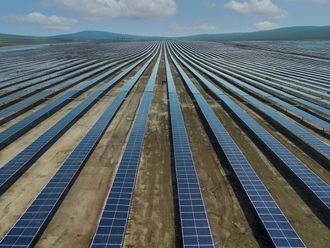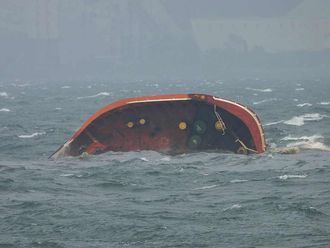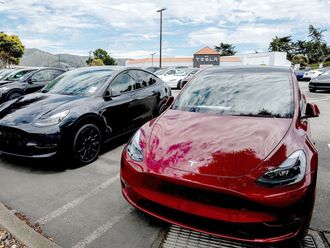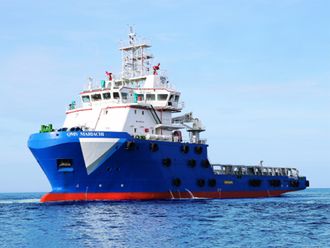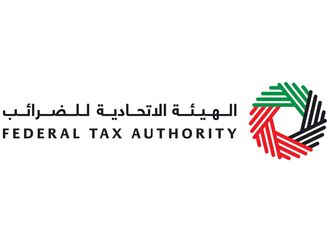Norwegian oil company Statoil's share price moved above its initial public offer level as the country's biggest part-privatisation to date got off to a firm start yesterday.
At 0850 GMT, Statoil shares were trading at 70 Norwegian crowns in Oslo, slightly above an IPO price of 69 crowns announced on Sunday. The overall Oslo index was down 0.2 per cent. Statoil shares opened on the Oslo bourse at 72 crowns, in line with brokers' estimates, but at the end of trading they closed flat at the IPO price of 69 crowns.
Statoil is valued at about 151 billion Norwegian crowns ($16.39 billion) after the IPO. The IPO price was set towards the lower end of a range of 66-76 crowns. The listing of Statoil, in Oslo and later yesterday in New York, is part of a government offer to sell 383.2 million shares, or 17.5 per cent of the firm aimed at meeting increasing international competition.
Statoil issued 188.7 million new shares, while the government sold 194.5 million shares. Norway could sell a further 2.5 per cent stake in an over-allotment option if market conditions were favourable.
Of the IPO shares sold, 78 per cent went to foreign investors, 16 per cent to Norwegian institutional investors and the remainder went to Norwegian private investors and Statoil staff, the company said on Sunday.
Brokers expected the opening price to be listed around 70-72 crowns. "I think this shows that there is great interest for the share," said one analyst. "But it seems like Norwegian institutions are a little bit low against what they should own," he said.
Statoil, Norway's leading gas and oil company, could sell additional chunks of itself by striking up partnerships with foreign oil and gas firms after the listing. The state will keep at least two-thirds control.
Norway is the largest non-Opec oil exporter, pumping about 3.1 million barrels of oil per day. In New York, company officials said the debut of Statoil's American Depositary Receipts on the New York Stock Exchange does not presage the return of Norway's state oil company to the U.S. exploration and production arena.
"We take the view that the U.S. is not the place where we will be most successful," said Richard Hubbard, executive vice president for exploration and production for international operations. Statoil shed its U.S. exploration and production holdings several years ago.
Instead, Statoil will parlay the technical competence it gained by exploring and producing oil and natural gas in the deep water of its own continental shelf to selected areas overseas rather than go face to face with U.S. majors, according to Inge Hansen, chief financial officer.
"To leverage the competence, technology-wise,...including enhanced recovery and the deep water activities, and also managing large and large and complex projects as well as the whole gas trade. These are the areas where we feel we can go out and do business internationally," said Hansen.
Statoil will concentrate its efforts on various projects in Angola, Western Europe, the Caspian, and Venezuela, where it has an synthetic crude oil project with Petroleos de Venezuela which is expected to produce 180,000 barrels per day of semi-finished light oil outside of Venezuela's Opec quota.
Statoil is pleased with the reception the ADR got on the New York Stock Exchange, where over 26 million shares were bought. "Overall, we are very pleased with our outcome on the IPO," said Hansen. The shares were trading at $7.47, down one cent, yesterday afternoon after touching a high of $7.50 earlier.
Analysts and fund managers said they viewed the stock as a long-term "hold" rather than one likely to provide spectacular gains from the start. "I think the first day was probably as expected from our point of view," said one analyst. "We saw a bit of uncertainty at least among Norwegian investors," he said, noting a general tendency to be cautious with a big IPO.
Fund managers said the relatively affordable price reflected the company's status as a long-term investment. "This is a minority holding in a company owned by the Norwegian government. That is part of the reason it is not highly priced," said Jeff Currington, head of European equities at Morley Fund Management in London.
Currington said he had bought shares in Statoil but was not expecting massive returns. "The perception is that it is an OK company but not a brilliant one," he said but added, "There is a bit of upside."
Ole Dahl, investment manager at Avanse Fondsforvaltning, said the marginal upswing at the open was a good start. "We have bought a lot of shares in Statoil as a long-term investment. Statoil is in a sector that we think is exciting and we will always have some shares in the company," he said.
Statoil, Norway's leading gas and oil company, could sell additional chunks of itself by striking up partnerships with foreign oil and gas firms after the listing. The state will keep at least two-thirds control.
"That's something that we are considering all the time. We are under no pressure. We'll take the time necessary to evaluate that," said Chief Executive Olav Fjell. Norway, the largest non-Opec oil exporter pumping about 3.1 million barrels of oil per day, does not necessarily need the money with a whopping budget surplus forecast by the government at 233 billion crowns in 2001.
"It (privatisation) is not because the state needs the money, but to give Statoil the same opportunities as our competitors, and to grow the business also in the distant future," Fjell said.
Statoil debuts at premium to IPO price
Norwegian oil company Statoil's share price moved above its initial public offer level as the country's biggest part-privatisation to date got off to a firm start yesterday.


